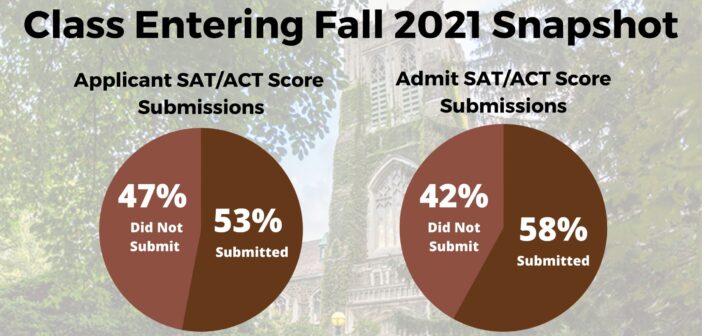In response to the pandemic, many colleges and universities allowed applicants to go test-optional with standardized tests in the admissions process.
Lehigh’s Director of Admissions Bruce Bunnick said Lehigh became test-optional for the class of 2025 and will remain test-optional until applicants for the class of 2027 submit their applications next year.
Bunnick said that for years, testing has been a helpful metric in understanding students’ preparedness for university courses, but that it is one part of a more holistic approach to admitting students to Lehigh that involves a variety of factors.
“There is a fairly large body of work that suggests there is a correlation between performance on these exams and performance in the first-year curriculum,” Bunnick said. “But they’re not always 100 percent reliable.”
This decision to go test-optional came from internal dialogue, external research, discussion with already test-optional institutions and recognition of the effects of the pandemic, Bunnick said.
As higher-ed institutions have become test-optional, college-bound students at Liberty High School have been sending their test scores to universities less frequently, said Stephanie Berry, a counselor at Liberty High School.
She said many of them do not believe test scores are an accurate measure of their abilities.
Berry said she thinks Liberty and testing organizations do a great job of ensuring widespread access to SAT/ACT preparation resources and necessary testing accommodations.
Regardless, she said she continues to be an avid supporter of colleges and universities going test-optional.
“I’m always pro test-optional for my kiddos, because I know not everybody’s a strong test-taker,” Berry said. “However, I do understand why colleges would want to go back to a mandatory requirement, because every school is different on their grading scales — some school districts don’t even rank.”
Bunnick said there was not a decline in the quality of Lehigh’s applicant pool due to the test optional policy.
Bunnick said in the winter or spring of 2023, the Office of Admissions will assess the future of standardized testing as an admissions tool at Lehigh.
Marilisa Jimenez Garcia, the founding director of the Institute on Critical Race and Ethnic Studies (ICRES) at Lehigh and chair of the Education Justice Initiative, said standardized testing wasn’t always part of the admissions process and arose after desegregation in the U.S., possibly stemming from a “desire to replicate racial inequality.”
She said the divides boil down to money. Some can afford specialized testing preparation courses and programs, either provided through schools or done privately. However, communities of color typically don’t have access to this privilege, ultimately leading to potential unfavorable sway in scores, admissions decisions and even scholarship opportunities through this system.
The University of California schools faced a lawsuit on the grounds that using SAT and ACT scores in admissions is discriminatory, and they have thus paused their use.
Research has correlated high SAT scores with family income, family education levels and race.
Jimenez Garcia emphasized that youth curriculum and testing are not standardized in the U.S., especially because it varies between states. In her years of research, she has found that this inequality could be a way in which racism “finds a way to reinvent itself.”
“I don’t think it’s really a question of whether or not it’s racist — it clearly upholds a superiority of white normative culture in the United States,” Jimenez Garcia said. “There needs to be more research done on this. There needs to be folks that are really looking at the cases, looking at the fallout and looking at what happens afterward.”






Comment policy
Comments posted to The Brown and White website are reviewed by a moderator before being approved. Incendiary speech or harassing language, including comments targeted at individuals, may be deemed unacceptable and not published. Spam and other soliciting will also be declined.
The Brown and White also reserves the right to not publish entirely anonymous comments.
1 Comment
It will be interesting to see if Lehigh and other schools track and publish how successfully those admitted with test scores perform and those without. Funny that data on how well students perform in colleges by their ACT/SAT test scores are not readily available. Dollars to donuts that the higher the test score the higher the GPA on average. Test scores provide useful tools, but not the only ones, when trying to determine the best admits for any colleges
Average GPAs and graduation rates going forward should inform how much weight should be given to test scores in evaluating students for admission.
The comment “…it clearly upholds a superiority of white normative culture in the United States,” demonstrates Garcia’s clear bias. What the heck is “white normative” culture anyway? In most western-style democracies, worldwide – not just the majority-white ones- the better educated you are, the better one’s odds of one’s economic success. That is not just a “white” thing.
The ACT and SAT are designed to assess academic preparedness and predict academic success; we will all soon have a better idea of how useful they really are.